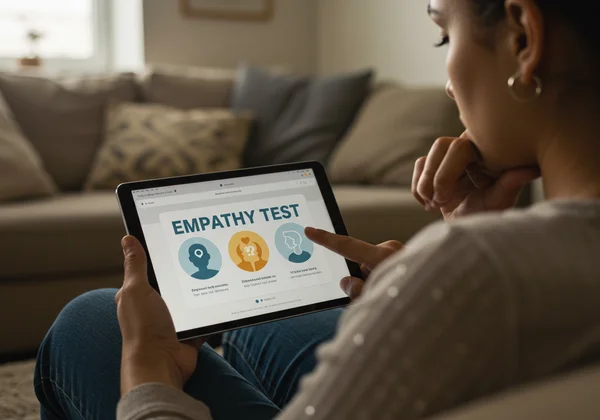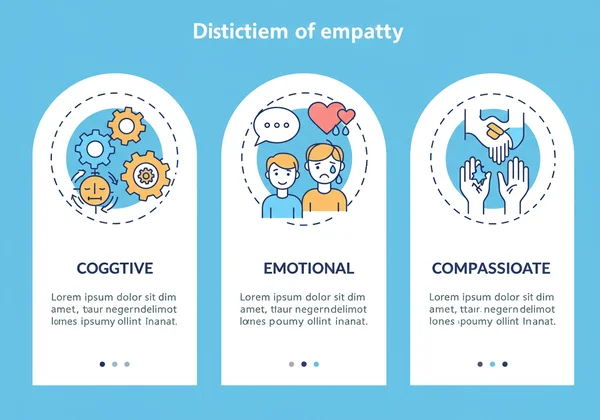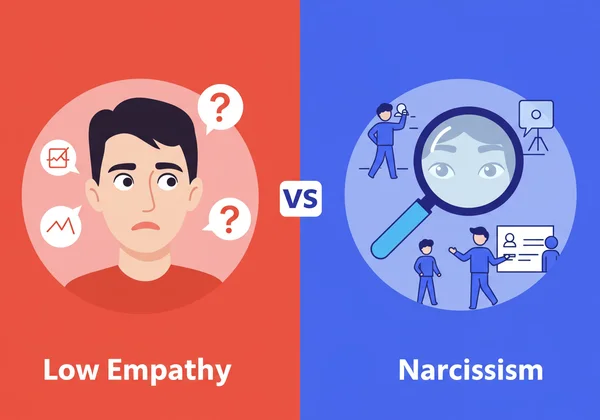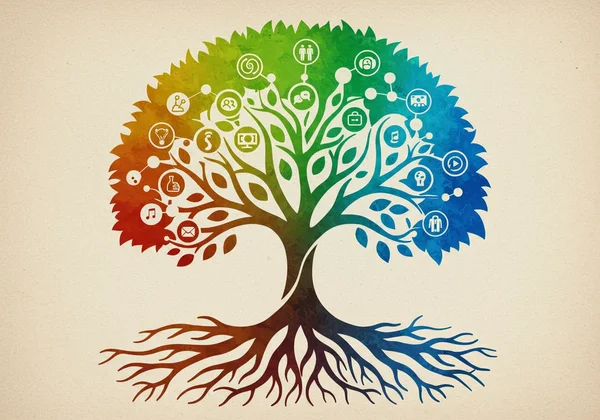Lack of Empathy & Narcissism: Take Our Empathy Test
September 29, 2025 | By Penelope Dean
Are you worried about a lack of empathy in yourself or someone you know? The internet is rife with discussions linking low empathy to alarming personality traits like narcissism. It's a heavy topic, and it's easy to fall down a rabbit hole of misinformation. How do I tell if I lack empathy? This guide will responsibly explore the nuances of this complex trait, distinguish between a simple absence of empathy and personality disorders, and provide clear steps for self-understanding without jumping to conclusions.
This journey into self-awareness is a crucial one. A great starting point is to establish a baseline. Before we dive deep, consider taking a moment to discover your score on a structured empathy test. It can provide a private, insightful snapshot of your current emotional landscape.

Understanding Empathy: More Than Just Feeling
Empathy is often oversimplified as "putting yourself in someone else's shoes." While that's part of it, this vital human capacity is much more intricate. It’s the engine of our social connections, influencing how we build relationships, communicate effectively, and cooperate. True empathy isn't just about feeling what others feel; it's also about understanding their perspective and being moved to help. Without it, our social world can feel disconnected and challenging. Understanding its components is the first step toward recognizing its presence, or absence, in ourselves and others.
The Three Types of Empathy: Cognitive, Emotional, and Compassionate
To grasp the full picture, it's helpful to break empathy down into its core types. People can be strong in one area and less developed in another.
- Cognitive Empathy: This is the intellectual side of empathy. It’s the ability to understand another person's perspective and see the world from their point of view. It's about thinking, "I understand why they feel that way," without necessarily feeling the emotion yourself. This is a key skill for negotiation, management, and clear communication.
- Emotional Empathy: This is the more commonly understood type—the ability to physically feel what another person is feeling, as if their emotions are contagious. When a friend is sad and you feel a pang of sadness too, that's emotional empathy at work. It's the foundation for deep, personal connection and bonding.
- Compassionate Empathy (or Empathic Concern): This type moves beyond understanding and feeling into action. It combines both cognitive and emotional empathy and adds a crucial element: the desire to help. This is the empathy that motivates us to offer assistance, lend a listening ear, or take action to alleviate someone else's suffering.

What Can Cause a Lack of Empathy?
A low empathy level isn't always a sign of a major problem. Various factors can temporarily or chronically dampen our ability to connect. Stress, burnout, and depression can consume our emotional resources, leaving little room to consider others' feelings. Certain upbringing styles or past traumas can also hinder the development of empathetic skills. In some cases, neurological differences or specific personality traits can play a role. It’s important to remember that a struggle with empathy is not an inherent character flaw but often a complex issue with deep roots that can be explored and understood through tools like an online empathy test.
Lack of Empathy vs. Narcissism: Drawing the Line
This is where many people get confused and worried. The terms "lack of empathy" and "narcissism" are often used interchangeably, but they are not the same thing. While a lack of empathy is a hallmark trait of Narcissistic Personality Disorder (NPD), not everyone who struggles with empathy is a narcissist. This is a critical distinction for fostering understanding rather than fear and judgment. Let's clarify the difference with this emotional intelligence test.
Defining Low Empathy: What It Truly Means to Struggle with Connection
Struggling with empathy can manifest in many ways. It might mean you have difficulty understanding social cues, find it hard to predict how others will react, or feel emotionally detached from the suffering of others. A person with low empathy might be seen as blunt, insensitive, or self-absorbed. However, they may not intend to cause harm. Often, they are simply unaware of the emotional impact of their words and actions. They might even feel regret or confusion when their behavior leads to hurt feelings, indicating a capacity for self-reflection and a desire for personal growth.
Understanding Narcissistic Personality Disorder (NPD)
Narcissistic Personality Disorder (NPD) is a formal clinical diagnosis and a far more complex and pervasive condition. According to the DSM-5, it's characterized by a persistent pattern of grandiosity, a constant need for admiration, and a profound lack of empathy. For someone with NPD, other people are often seen as tools to serve their own needs for validation and status. Their lack of empathy isn't just a blind spot; it's often coupled with a sense of entitlement and a willingness to exploit others for personal gain.
Key Distinctions: Intent, Impact, and Self-Awareness
The crucial difference often lies in intent and self-awareness. A person with low empathy might accidentally hurt someone's feelings and, upon realizing it, feel remorse. They may be open to feedback and willing to change. In contrast, someone with NPD often lacks this self-awareness. They may not recognize their actions as hurtful or may simply not care, believing their own needs and feelings are superior. The lack of empathy in NPD is a core part of a defensive, self-aggrandizing worldview, whereas general low empathy can be a skill deficit that one can work on.

When to Be Concerned: Recognizing Traits in Yourself or Others
Understanding these concepts is one thing; applying them to real life is another. If you're questioning your own empathy levels or are concerned about someone else, it's important to look at patterns of behavior rather than isolated incidents. Everyone has moments of selfishness or insensitivity. The key is to observe the consistency and severity of these behaviors. If you're ready to explore these patterns, a great first step is to take our empathy quiz.
Common Behaviors Associated with Lower Empathy
Here are some common signs that might indicate a struggle with empathy:
- Frequently offering unsolicited advice instead of listening.
- Having trouble understanding or relating to feelings that are different from your own.
- Finding it difficult to maintain long-term relationships.
- Being perceived as overly critical or judgmental of others.
- Often getting into arguments due to misunderstandings about others' intentions.
- Feeling impatient or annoyed when others are emotional.
Recognizing these behaviors is not about assigning blame. It's about identifying areas for potential self-improvement.
Red Flags: When to Seek Professional Psychological Help
While self-reflection is powerful, some situations warrant professional guidance. If a lack of empathy is part of a larger pattern that includes manipulation, a consistent disregard for others' rights, verbal or emotional abuse, or an inability to accept any responsibility, it's time to encourage seeking help from a licensed therapist or psychologist. It's crucial to remember that online tools and articles are for self-exploration and education, not diagnosis.
Disclaimer: This empathy test is an informational tool for self-reflection, not a substitute for professional psychological diagnosis or advice.
Beyond Labels: Cultivating Empathy for Personal Growth
Regardless of where you stand, empathy is not a fixed trait. It's a skill that can be developed and strengthened over time, much like a muscle. Moving beyond labels like "empath" or "narcissist" and focusing on practical action is the most empowering approach. The goal is progress, not perfection. Taking an empathy quotient test can provide you with a personalized map for this journey.
Practical Strategies to Build Your Empathy Muscle
Improving empathy involves conscious, consistent effort. Here are a few actionable strategies:
-
Practice Active Listening: When someone is talking, focus completely on their words, tone, and body language. Resist the urge to plan your response. Ask clarifying questions to ensure you understand their perspective.
-
Read More Fiction: Studies have shown that reading literary fiction can improve a person's ability to understand the thoughts and feelings of others.
-
Step Outside Your Comfort Zone: Interact with people from different backgrounds, cultures, and walks of life. This broadens your perspective and challenges your assumptions.
-
Practice Mindfulness: Mindfulness meditation helps you become more aware of your own emotions, which is a foundational step to recognizing them in others.

Discover Your True Empathy Score: A First Step to Self-Awareness
Curiosity is the engine of growth. If this article has sparked questions about your own emotional abilities, the best next step is to get a clear, objective starting point. Our comprehensive Empathy Test is designed based on psychological principles to help you do just that. It's a confidential, insightful tool that gives you a personalized empathy score and highlights your unique strengths and areas for development. Don't guess about your ability to connect—test your empathy today and begin your journey toward greater self-awareness and stronger relationships.
Your Journey to Greater Empathy Begins Now
Navigating the complex world of empathy and personality can be challenging. The labels we find online can be scary, but they rarely tell the whole story. Remember, understanding is the first step toward growth and healthier relationships. Low empathy is not a life sentence, and it is fundamentally different from a clinical personality disorder. By reflecting on these insights and taking proactive steps like exploring your own tendencies, you're already on your path to greater self-awareness. Ready to take that next step? Take our free empathy test to get started.
Frequently Asked Questions About Empathy and Personality
How do I know if I'm empathetic?
You likely have strong empathetic traits if you often find yourself considering others' feelings, feeling attuned to the emotional atmosphere of a room, and feeling genuinely happy for others' successes or sad for their misfortunes. You prioritize listening and find it natural to imagine situations from another's point of view.
How do I tell if I lack empathy?
You might struggle with empathy if you often find social interactions confusing, have trouble predicting how people will react, or are told you come across as insensitive or blunt. You may prioritize logic over emotion in every situation and feel disconnected from or impatient with the emotional experiences of others.
Is there a reliable online test for empaths or low empathy?
Yes, well-designed online tests can be a reliable first step for self-assessment. A credible empathy test, like our online empathy test, is based on established psychological principles to provide a consistent and insightful score. While not a clinical diagnosis, it's an excellent tool for personal reflection and identifying growth areas.
Am I an empath or could I be narcissistic?
This is a common fear. The key difference often lies in self-awareness and motivation. An empath feels others' emotions deeply, sometimes to their own detriment. A person with narcissistic traits often lacks this genuine emotional connection and may mimic empathy only to achieve a personal goal. If you are genuinely worried about your impact on others, that self-reflection is a strong sign against narcissism.
What mental illness or conditions can cause a significant lack of empathy?
A profound lack of empathy, often called affective or emotional empathy, is a primary diagnostic criterion for Antisocial Personality Disorder (ASPD) and Narcissistic Personality Disorder (NPD). Certain conditions on the autism spectrum may involve difficulties with cognitive empathy (understanding social cues) but not necessarily a lack of emotional feeling. It's essential to consult a mental health professional for any diagnosis.